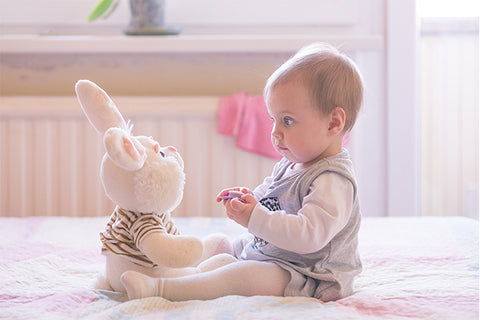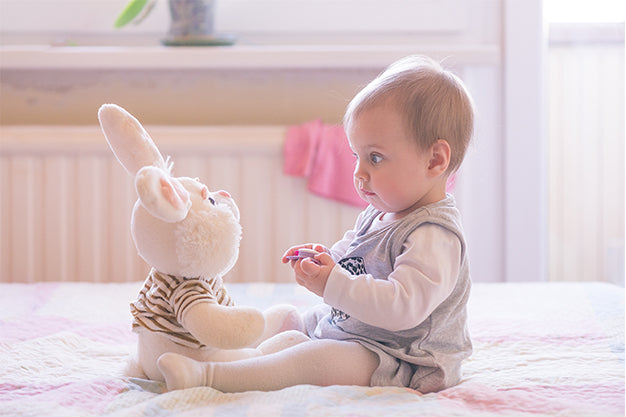
It’s a question that’s been swirling around parenting groups for decades: should I let my baby have a dummy? The problem is that you can ask a dozen different mothers, a dozen different maternal health nurses and a dozen different baby-development professionals and they’ll all give you a different opinion. And it’s this conflicting advice that can be detrimental to your child’s wellbeing – not to mention your own sanity.
Thankfully, we’re here to help. First of all, there's no ‘right’ choice. Every child and every situation will be different, so don’t sweat the small stuff. While you’re here though, it’s a good idea to get educated about the pros and cons of dummies so you can make an informed decision that best suits your baby and your lifestyle.
When is the right time to use a dummy?
There’s no one-size-fits-all rule for when you should start using a dummy, but it is important to get bub’s feeding routine on track before introducing something new. Start too early and it could interfere with your baby’s confidence for breastfeeding. This is because the feeling of the dummy plus the innate sucking response may be confusing.
That’s why it’s best to wait until your little one is around three to four weeks old before introducing the dummy. However, if they’re great at latching, feeding and gaining weight like a mini body builder, then starting with a dummy a little earlier is fine.
Bottle-fed or premature babies may take a dummy earlier than three weeks, and this can actually provide parents with greater peace of mind. After all, research from Red Nose found “there is strong evidence that dummies are associated with a reduced risk of sudden infant death when used consistently”.
When is it time to take the dummy away – for good?
No matter how good your baby is at taking the dummy, during naptimes they will inevitably tumble out of bub’s mouth. And when he or she stirs, it’ll be your job to pop it back in before they get too cranky or wake themselves up completely.
That can put a real dampener on your own sleeping patterns, especially when the eight-month sleep regression hits. At around this stage, you may want to start thinking about lowering the frequency of dummy use – but definitely don’t stop the dummy cold turkey. Maybe only give them the dummy when it’s time for a nap and then once they are down you can take the dummy out completely. Over the course of the coming weeks and months, limit their use even more until it’s no longer a dependence.
It’s recommended that babies only use dummies for sleeping and comfort from 12 months onwards, and by their second birthday it should be very infrequent if not entirely gone. What you don’t want to happen is for your bub to turn four or five and have increased dental problems later in life.
The dummy: For or against
While some parents swear by the dummy, others say the risk of dependence is too great. So what should you take into account when making a decision? Let’s explore:
|
For Dummy |
Against Dummy |
| Has been shown to reduce the risk of SUDI (sudden unexpected death in infants) when used regularly. | Can create nipple confusion, which may interfere with breastfeeding and weight gain. It’s best to get into a good breastfeeding rhythm before introducing a dummy. |
|
Is a great way to provide comfort and soothe your baby - especially when it's bedtime. |
Slightly increases the risk of ‘middle ear’ infections.the risk of ear infections. |
|
Can help quieten your baby, which is especially helpful for mothers experiencing post-partum depression or sever sleep deprivation |
It may lead to poor eating habits, weight loss or interfere with weight gain. |
|
They are a great distraction! If bub is too cranky to feed and you need to pump, the Pigeon GoMini Double Electric Breast Pump can take care of everything while a dummy keeps the little one entertained. |
Risk of dependency |
|
Helps with traveling. The sucking and swallowing motions ease pressure in bub's ears. |
Prolonged or excessive use may lead to increased chances of dental problems as they grow up.
|
|
Babies are very independent – if there’s no dummy, they’ll find the next best thing: their thumb. This is a much harder habit to break because you can’t confiscate a thumb!our baby wants to suck on something they will find the next best thing… their thumb. |
If the dummy gets lost, expect plenty of tantrums (so if you decide to use one, keep a few extras on hand!). |
The choice is yours – and there’s no ‘wrong’ decision
Hopefully this information has helped put your mind at ease so you can focus on more important things – like raising your little one to be healthy and happy!
Interested in learning more about baby accessories? Visit our guide to Breastfeeding While Travelling.
For more tips and tricks on parenthood, breastfeeding and keeping your bub on the path to greatness, check out our helpful blogs or follow us Facebook and Instagram.



